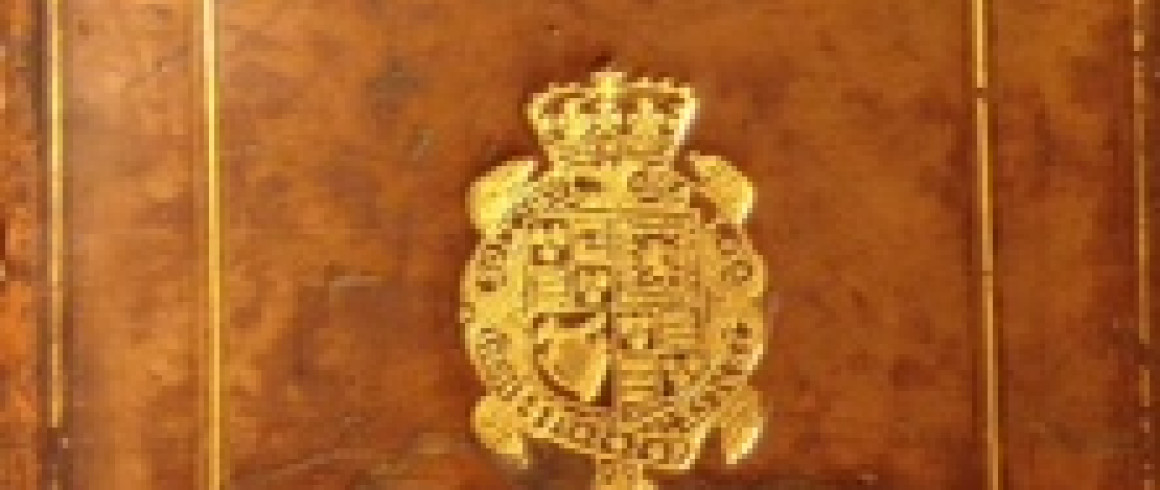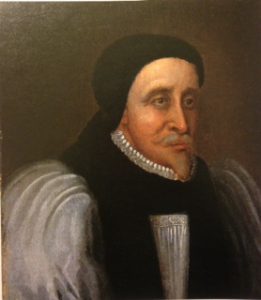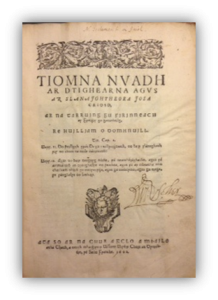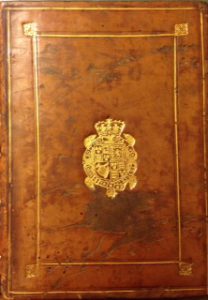Lancelot Andrewes and a royal gift of books
Following the successful completion of the Incunabula Cataloguing project, the College Library has recently embarked on a new venture: the cataloguing of the Lancelot Andrewes’ Collection of early printed books.
Lancelot Andrewes (1555-1626) is a well-known figure at Pembroke, where he served as Master for 16 years (1589-1605), before becoming Bishop of Chichester, Ely and Winchester. A reputed scholar and an exceptional linguist (he is thought to have mastered 15 modern languages and 6 ancient ones), Andrewes is best remembered for his important contribution to the production of the King James Bible, for which he translated parts of the Old Testament from Hebrew. Upon his death in 1626, Andrewes left the majority of the books in his private library, more than 300 folio volumes to Pembroke College, where they still reside today.
Lancelot Andrewes’ collection strongly reflects his prominent interests in theology, biblical studies and scholastic linguistics. The bishop owned more than 30 Bibles printed in various foreign languages, ranging from ancient Latin, Hebrew, Greek and Syriac to modern French, Spanish, Italian, German and Hungarian. So it was not surprising to find a copy of the first Bible printed in Irish (The New Testament, Dublin, 1602) among the bishop’s collection. There was, however, something slightly different about this particular copy of the Bible: the volume was bound in 17th-century calf skin, with what appeared to be royal arms stamped on both covers and it had an inscription on the title page reading “W. Ussher”.
Near Left: Binding with the arms of King James 1
Far Left: Title page of the Irish Bible (Dublin 1602)
A closer examination of the binding revealed that the arms belong to James I, King of England and Ireland, and the owner of the inscription was identified as Sir William Ussher, Clerk of the Privy Council of Ireland, and principal editor of the book in question. Taken together, these two details strongly suggest that the book was probably a presentation copy to King James I (who was also the dedicatee of the volume), from the editor and publisher Sir William Ussher.
A few weeks after cataloguing the Irish Bible, we came across a similar item, this time a Book of Common Prayer printed in Dublin in 1608 and bound in the same calf skin binding, gold-stamped with the arms of King James I on both boards.
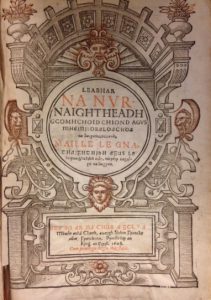 Leabhar na nurnaightheadh gcomhchoidchiond (Title page of the Book of Common Prayer, Dublin 1608)
Leabhar na nurnaightheadh gcomhchoidchiond (Title page of the Book of Common Prayer, Dublin 1608)
So how did the two books end up in Lancelot Andrewes’ library and consequently at Pembroke College? While the exact details are not known, it can be assumed that the king himself gifted the volumes to Andrewes, a man he greatly admired for his scholarship and powerful preaching. Andrewes had, in fact, been a favourite of James I since the latter’s coronation in 1603 and, as a result, the Master of Pembroke was often invited to preach before the royal court. But perhaps the best evidence of the king’s admiration and trust in Andrewes’ scholastic abilities was his appointment as the general editor and lead translator of the committee entrusted with producing King James’ Bible. As part of a team of 47 distinguished scholars and clergymen, Andrewes helped create what is now considered a literary masterpiece and one of the most influential works of the English language and culture.
The translation of the New Authorized Version of the Bible was finalized around the year 1610 and, given the fact that the first Irish Book of Common Prayer was printed in 1608, it can be surmised that the two volumes given to Andrewes were perhaps an expression of the king’s gratitude for a job well done. Regardless of the particular circumstances of the donation, the presence of the royal gift here at Pembroke is a testament to the importance of Lancelot Andrewes’ scholarship and cultural presence in seventeenth century England and beyond.
